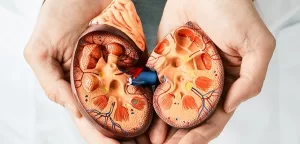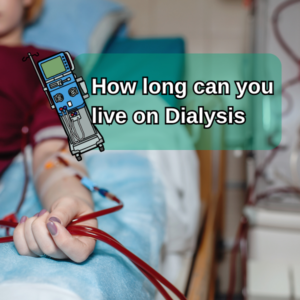+90 533 813 89 77
info@bookingforhealth.com

What you need to know for Kidney Failure
Signs of dying from kidney failure
When someone is nearing the end stages of kidney failure, they may experience extreme fatigue, confusion, difficulty breathing, and decreased urine output. As the kidneys lose their function, waste products and fluids can build up in the body, leading to these severe symptoms. Additionally, individuals may develop complications like heart problems and electrolyte imbalances, which can further exacerbate their condition.
How to prevent kidney failure
Preventing kidney failure involves taking several proactive steps to maintain kidney health. These include adopting a healthy lifestyle with regular exercise, a balanced diet, and adequate hydration. Controlling blood pressure and diabetes is crucial since these conditions can cause kidney damage over time. Avoiding excessive use of medications, especially non-prescription pain relievers, is essential as they can harm the kidneys. Additionally, limiting alcohol consumption and quitting smoking are beneficial for kidney health.
5 stages of kidney failure
Kidney failure is typically classified into five stages, known as stages 1 to 5, with stage 5 being the most severe. The stages are determined based on the glomerular filtration rate (GFR), which measures how well the kidneys are functioning. In stage 1, kidney damage is mild, while in stage 5, also known as end-stage renal disease (ESRD), the kidneys have lost almost all their ability to function.
Stage 5 kidney failure
Stage 5 kidney failure, or end-stage renal disease (ESRD), is the final stage of kidney disease. At this point, the kidneys have lost about 90% to 95% of their function, and they are no longer able to filter waste products and excess fluids from the blood effectively. As a result, individuals with stage 5 kidney failure require renal replacement therapy, such as dialysis or a kidney transplant, to survive.
BUN level indicating kidney failure
Blood Urea Nitrogen (BUN) is a blood test used to assess kidney function and the body’s waste product levels. While there is no specific BUN level that indicates kidney failure, a BUN level above the normal range (typically 7-20 mg/dL) may suggest kidney dysfunction. However, BUN levels can also be influenced by other factors, so further tests are necessary to confirm kidney failure.
Symptoms of kidney failure due to diabetes
Kidney failure caused by diabetes, known as diabetic nephropathy, may manifest with symptoms such as fatigue, swelling in the legs and ankles (edema), frequent urination, and high blood pressure. Additionally, individuals may experience proteinuria, where excess protein is excreted in the urine, indicating kidney damage.
Number of stages of kidney failure
There are five stages of kidney failure, ranging from mild kidney damage (stage 1) to complete kidney failure (stage 5).
Clear urine as a sign of kidney failure
No, clear urine is not a typical sign of kidney failure. In fact, one of the early signs of kidney failure is a change in urine color, such as dark or foamy urine, due to the presence of blood or protein.
5 stages of kidney failure symptoms
The symptoms of kidney failure can vary depending on the stage. In the early stages, individuals may have few or no symptoms, while in later stages, they may experience fatigue, weakness, shortness of breath, swelling, changes in urine output, nausea, and confusion.
Stages of kidney failure
The stages of kidney failure are determined by the glomerular filtration rate (GFR) and the extent of kidney damage. They range from stage 1 (mild kidney damage) to stage 5 (end-stage renal disease).
What happens in stage 5 kidney failure?
In stage 5 kidney failure, the kidneys have lost almost all their ability to function, resulting in a severe decline in the glomerular filtration rate (GFR). This leads to an accumulation of waste products and fluid retention in the body, causing various complications such as high blood pressure, anemia, bone problems, and electrolyte imbalances. Without renal replacement therapy, such as dialysis or a kidney transplant, stage 5 kidney failure is life-threatening.
Alcohol causing kidney failure
Prolonged and heavy alcohol consumption can harm the kidneys and contribute to the development of kidney failure. Alcohol can cause dehydration, increase blood pressure, and directly damage kidney tissues, leading to impaired kidney function over time.
Decreased urine output as a sign of kidney failure
Yes, decreased urine output can be a sign of kidney failure. As the kidneys lose their ability to filter waste and fluids, urine production may decrease, leading to reduced urine output.
Number of stages of kidney failure
There are five stages of kidney failure, ranging from mild kidney damage (stage 1) to complete kidney failure (stage 5).
Blood pressure medications causing kidney failure
Certain blood pressure medications, such as nonsteroidal anti-inflammatory drugs (NSAIDs) and some diuretics, may potentially cause kidney damage if used inappropriately or in high doses. However, these medications are generally safe when prescribed and monitored by a healthcare professional.
Diabetes causing kidney failure
Yes, diabetes is one of the leading causes of kidney failure. Over time, high blood sugar levels can damage the small blood vessels in the kidneys, impairing their ability to filter waste and fluids effectively.
Kidney failure hereditary
In some cases, there may be a genetic predisposition to kidney disease. Certain genetic conditions can lead to kidney problems and an increased risk of kidney failure.
Kidney failure causing diarrhea
In advanced stages of kidney failure, electrolyte imbalances can occur, leading to gastrointestinal symptoms such as diarrhea.
Reversing kidney failure
While it may be possible to slow down the progression of kidney failure with early intervention and proper management of underlying conditions, complete reversal is rare. Once the kidneys have suffered extensive damage, it is challenging to restore their full function. However, prompt medical care, lifestyle changes, and adherence to prescribed treatments can help preserve remaining kidney function.
Kidney failure causing bleeding
In advanced kidney failure, the kidneys may struggle to produce enough platelets or clotting factors, leading to an increased risk of bleeding.
High blood pressure causing kidney failure
Chronic high blood pressure can damage the blood vessels in the kidneys, reducing their ability to function correctly. Over time, this can lead to kidney failure.
Kidney failure causing back pain
Kidney failure itself is not a common cause of back pain. However, kidney problems such as kidney stones, infections, or cysts can cause back pain.
Reducing leg swelling due to kidney failure
To reduce leg swelling (edema) caused by kidney failure, individuals should follow their prescribed treatment plan, limit salt intake, elevate the legs when sitting or lying down, and wear compression stockings if recommended by a healthcare professional.
First warning signs of kidney failure
The early signs of kidney failure can be subtle and may include changes in urination patterns (increased or decreased urine output), foamy or dark urine, fatigue, weakness, and swelling in the legs and ankles.
Remdesivir causing kidney failure
Remdesivir is an antiviral medication used to treat certain viral infections, including COVID-19. While kidney injury has been reported as a potential side effect of remdesivir treatment, it is considered relatively rare. Individuals receiving remdesivir should be closely monitored for any signs of kidney dysfunction, and healthcare professionals will assess the risk-benefit ratio before administering the drug.
How one can die from kidney failure?
In end-stage kidney failure, the kidneys lose almost all their ability to filter waste and regulate fluid balance in the body. As a result, waste products and toxins accumulate, leading to severe electrolyte imbalances, fluid overload, and potential damage to other organs. Without effective treatment such as dialysis or a kidney transplant, these complications can become life-threatening and ultimately result in death.
Chances of surviving liver and kidney failure
The chances of surviving liver and kidney failure depend on various factors, including the underlying cause, the extent of organ damage, the overall health of the individual, and the promptness of medical intervention. In cases of severe liver and kidney failure, survival rates can be lower, and organ transplantation may be necessary for long-term survival.
Illegal drugs causing kidney failure
Several illegal drugs can harm the kidneys and potentially lead to kidney failure. Substances like heroin, cocaine, methamphetamine, and synthetic cannabinoids can cause direct damage to the kidneys, disrupt blood flow, and lead to kidney function decline.
Do you die from kidney failure?
Yes, kidney failure can be fatal if left untreated or if it progresses to end-stage renal disease (ESRD) without adequate medical intervention. However, many cases of kidney failure can be managed effectively with early diagnosis, appropriate treatment, and lifestyle changes to slow down its progression.
Does drinking cause kidney failure?
Excessive alcohol consumption can contribute to kidney damage and increase the risk of kidney failure over time. Alcohol can lead to dehydration and impair kidney function, making the organs less effective at filtering waste and toxins from the blood. Reducing alcohol intake and maintaining a healthy lifestyle can help prevent alcohol-related kidney damage.



